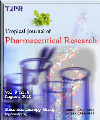
|
Tropical Journal of Pharmaceutical Research
Pharmacotherapy Group, Faculty of Pharmacy, University of Benin, Benin City, Nigeria
ISSN: 1596-5996
EISSN: 1596-5996
Vol. 16, No. 3, 2017, pp. 515-523
|
 Bioline Code: pr17067
Bioline Code: pr17067
Full paper language: English
Document type: Research Article
Document available free of charge
|
|
|
Tropical Journal of Pharmaceutical Research, Vol. 16, No. 3, 2017, pp. 515-523
| en |
Eleutheroside E inhibits doxorubicin-induced inflammation and apoptosis in rat cardiomyocytes by modulating activation of NF-κB pathway
Wu, Zheng; Li, Wenzheng; Sun, Yuhua; Fu, Kun & Cheng, Shujuan
Abstract
Purpose: To identify the effects of eleutheroside E (EE) on apoptosis and inflammation induced by
doxorubicin (DOX) in H9c2 cells and to investigate the underlying mechanisms.
Methods: The effect of EE on H9c2 cell viability was determined using Cell Counting Kit-8 (CCK8). EE
effect on DOX-induced apoptosis and inflammation in H9c2 cells was studied by comparison between
cells treated with DOX alone and DOX+EE; the relationship between EE effects and NF-κB signaling
pathway was evaluated by the addition of NF-κB inhibitor PDTC. Cell apoptosis was examined by flow
cytometry while IL-1β, IL-6, and TNF-α levels were determined by ELISA. The phosphorylation level of
NF-κB p65 was measured by Western blot.
Results: Compared with control group, cell viability was notably elevated after treatment with 50-100
μM EE for 48 or 72 h. DOX induced higher rates of cell apoptosis in H9c2 cells (29.5 ± 3.56 %)
compared with control group (6.39 ± 0.67 %); however, with EE pretreatment (50 and 80 μM), apoptosis
rate decreased to 16.8 ± 2.16 and 13.54 ± 2.08 %, respectively, which are significantly lower than that
of DOX group; furthermore, the levels of IL-1β, IL-6, and TNF-α also reduced. In addition, DOX-induced
phosphorylation of NF-κB p65 was suppressed by EE pretreatment (10, 50 and 80 μM) to 11.51 ± 1.25,
40.2 ± 5.17 and 52.97 ± 6.74 %, respectively
Conclusion: The results suggest that EE treatment reduced DOX-induced apoptosis and inflammation
by interacting with NF-κB signaling pathway. This finding sheds some light on probable new strategies
on the application of DOX for cancer treatment.
Keywords
Eleutheroside E; Doxorubicin; Inflammation; Apoptosis; Cardiomyocytes; NF-κB
|
| |
© Copyright 2017 - Pharmacotherapy Group, Faculty of Pharmacy, University of Benin, Benin City, 300001 Nigeria.
Alternative site location: http://www.tjpr.org
|
|
